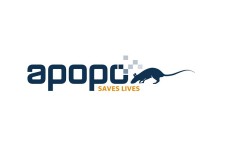APOPO Foundation

.
APOPO, an acronym for Anti-Persoonsmijnen Ontmijnende Product Ontwikkeling (in English : Development of a landmine detection product) is a Belgian non-governmental organization that trains savannah cricetomes to detect landmines or tuberculosis. Its mission is to develop a detection method using cricetomes (also known as Gambian rats), in order to solve global problems and inspire positive social change. The organization works primarily in Africa (Angola, Mozambique, Tanzania) and Asia (Thailand and Cambodia) and South America (Colombia).
History
Bart Weetjens, the founder of APOPO, already owned domesticated rats as a child and naturally established a special bond with these rodents. A few years later, he developed a strong interest in Africa, where he traveled several times as a student. Thinking about the limited resources of farmers, he came up with the idea of using rodents to detect landmines. In 1998, APOPO was registered as a non-profit organization in Belgium.
In 2003, APOPO began operations in Mozambique, with its first demining rats obtaining official accreditation in 2004 under the International Mine Action Standards (IMAS)1.
In 2008, APOPO was able to provide evidence that specially trained rats were able to detect TB in human sputum samples. In 2010, APOPO initiated a three-year research plan to closely examine the efficacy of rat detection of TB, comparing this method to other diagnostic methods and focusing on future application models for this technology.
In 2018, APOPO partnered with the University of Manchester in a joint research effort to further explore odor detection of different diseases.
On March 5th 2015, APOPO opened the APOPO Foundation in Geneva, placing APOPO at the center of International Demining efforts and World Health. The APOPO Foundation aims to support the organizations’ overall global activities by strengthening its network and financial resources whilst making sure it is now placed at the forefront of international mine action efforts and international health in Geneva.
.
- Foundation
.
- Infectious disease
.
- Diagnostic
.
- Mainly international
.




